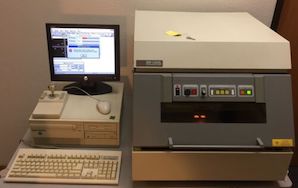
Curated with aloha by
Ted Mooney, P.E. RET

The authoritative public forum
for Metal Finishing 1989-2025

-----
Acid reaction with metals as identification
Q. I work in the aircraft industry and need to find out what metals will react with various acids. this is purely for identification purposes. I am trying to find what acids are used, when applied on metals, e.g., aluminium, magnesium, silver, copper, etc. will react by showing a colour identification similar to litmus paper. an example of this is finding metal in a oil filter and trying to identify what metal it is to locate the component which is breaking up.
hope you can help...thanks
student - Sydeny, NSW, Australia
2004
A. I'm not sure if I really understand, but you can get a copy of "Rapid Spot Testing of Metals, Alloys, and Coatings" from Metal Finishing Information Service.

Ted Mooney, P.E.
Striving to live Aloha
finishing.com - Pine Beach, New Jersey
Spot tests for plating type identification
Q. Hi, I'm restoring some 60's Triumph motorcycles which have different plating on the various parts. After 50+ years of corrosion I find it hard to determine what plating is on some of the parts, chrome, nickel, or cadmium.
Is there any way to determine what type of plating is present such as acid reaction, scratch resistance, something else?
Thanks
restorer - Grand Ledge, Michigan, USA
November 30, 2019
A. Hi Eric, if you had access to sophisticated test equipment like beta-backscatter and x-ray fluorescence machines it might be relatively easy. I hate to bear bad tidings but I think you'll find efforts to track down what plating Triumph put on them more rewarding than trying spot tests. The problem with spot tests is that it almost always takes two, and often three or more tests to identify the plating; and when it's worn through, so the substrate participates in the reaction, it can be especially hard. It's probably possible, but probably too much effort to be realistic :-)
Regards,

Ted Mooney, P.E. RET
Striving to live Aloha
finishing.com - Pine Beach, New Jersey
December 2019
![]() Thanks. Looks like more research for me.
Thanks. Looks like more research for me.
- Grand Ledge, Michigan, USA
December 4, 2019
Q, A, or Comment on THIS thread -or- Start a NEW Thread
